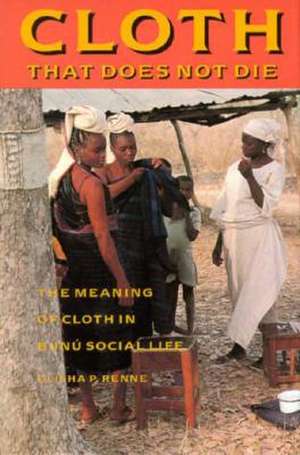Cloth That Does Not Die: The Meaning of Cloth in Bunu Social Life: McLellan Endowed
Autor Elisha P. Renneen Limba Engleză Hardback – 31 oct 1995 – vârsta de la 22 ani
"Cloth only wears, it does not die," the paradoxical phrase from a Bunu Yoruba prayer, emphasizes the power of cloth as a symbol of continuing social relations and identities in the face of uncertainty and death. The Bunu Yoruba people of central Nigeria mark every critical juncture in an individual's life, from birthing ceremonies to funeral celebrations, with handwoven cloth. Anthropologist Elisha Renne explains how and why this is so and discusses why handwoven cloth is still valued although it is rarely woven in Bunu villages today.
Special marriage cloths mark changes in the status of Bunu brides, as well as in the social connections of kin during traditional marriage rituals. In funerals, handwoven cloth is used to rank chiefs; in masquerade performances, it indicates the presence of ancestral spirits. As tailored and untailored dress, it expresses gender and educational differences. Further, it is worn to distinguish ritual events that have a unique Bunu identity from everyday affairs where commercial, industrially woven cloth prevails.
Renne examines the use and production of cloth in Bunu society from approximately 1900 to the present. Some traditions associated with cloth have given way to changes brought about by long contact with Christian missionaries and by British colonial policies that altered methods of cotton and cloth production. Today weaving is no longer done as a matter of course by all village women, but rather has become the specialty of only a few.
Why does handwoven cloth still play such a vital role in Bunu social life when, in fact, Bunu women have largely given up weaving? To explain cloth's continued cultural importance, Renne takes the story beyond the descriptive and historic to examine the meaning of different kinds of cloth for various members of Bunu village communities -- from wives and diviners to chiefs and hunters.
The details of Bunu village life in "Cloth That Does Not Die" complement the many uses of cloth that Renne interprets. Anthropologists, social historians, and historians of African art will find the book of great value as an example of how material culture can integrate the study of various aspects of social life. The book will interest textile artists with its close attention to the visual properties of cloth itself.
Preț: 275.66 lei
Nou
52.75€ • 55.07$ • 43.66£
Cartea se retipărește
Specificații
ISBN-10: 0295973927
Pagini: 216
Dimensiuni: 164 x 243 x 25 mm
Greutate: 0.63 kg
Ediția:New.
Editura: University of Washington Press
Seria McLellan Endowed
